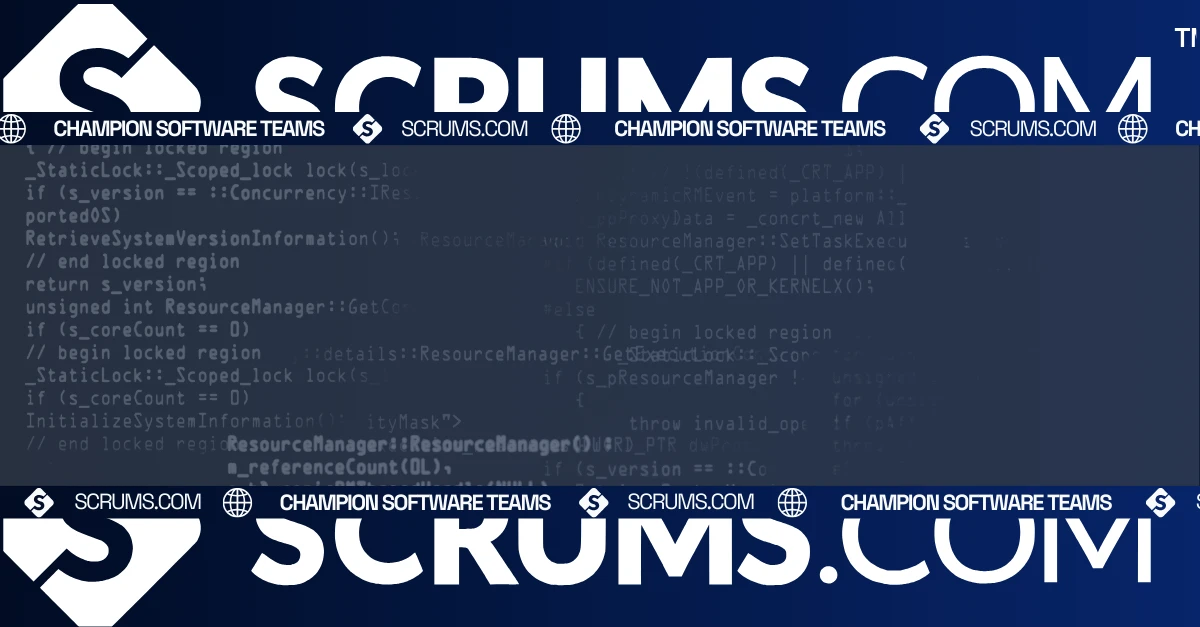Hiring C Software Developers
Scrums.com's 10,000+ software developer talent pool includes experts across a wide array of software development languages and technologies giving your business the ability to hire in as little as 21-days.







































Years of Service
Client Renewal Rate
Vetted Developers
Ave. Onboarding
Africa Advantage
Access world-class developers at 40-60% cost savings without compromising quality. Our 8,500+ talent pool across Africa delivers enterprise-grade engineering with timezone overlap for US, UK, and EMEA markets.
AI-Enabled Teams
Every developer works within our AI-powered SEOP ecosystem, delivering 30-40% higher velocity than traditional teams. Our AI Agent Gateway provides automated QA, code reviews, and delivery insights.
Platform-First Delivery
Get real-time development visibility into every sprint through our Software Engineering Orchestration Platform (SEOP). Track velocity, blockers, and delivery health with executive dashboards.
Align
Tell us your needs
Book a free consultation to discuss your project requirements, technical stack, and team culture.
Review
We match talent to your culture
Our team identifies pre-vetted developers who match your technical needs and team culture.
Meet
Interview your developers
Meet your matched developers through video interviews. Assess technical skills and cultural fit.
Kick-Off
Start within 21 days
Developers onboard to SEOP platform and integrate with your tools. Your first sprint begins.
Don't Just Take Our Word for It
Hear from some of our amazing customers who are building with Scrums.com Teams.
Flexible Hiring Options for Every Need
Whether you need to fill developer skill gaps, scale a full development team, or outsource delivery entirely, we have a model that fits.
Augment Your Team
Embed individual developers or small specialist teams into your existing organization. You manage the work, we provide the talent.
Dedicated Team
Get a complete, self-managed team including developers, QA, and project management – all orchestrated through our SEOP platform.
Product Development
From discovery to deployment, we build your entire product. Outcome-focused delivery with design, development, testing, and deployment included.
Access Talent Through The Scrums.com Platform
When you sign-up to Scrums.com, you gain access to our Software Engineering Orchestration Platform (SEOP), the foundation for all talent hiring services.
View developer profiles, CVs, and portfolios in real-time
Activate Staff Augmentation or Dedicated Teams directly through your workspace

Need Software Developers Fast?
Deploy vetted developers in 21 days.
Tell us your needs and we'll match you with the right talent.
What is C Programming and Why It Matters for Your Business
C is a powerful, general-purpose programming language that has been the backbone of software development since its creation in the early 1970s. Known for its efficiency, portability, and flexibility, C is widely used for system-level programming, embedded systems, real-time operating systems, and performance-critical applications. According to the TIOBE Index 2023, C remains one of the top 5 most popular programming languages, highlighting its continued relevance in modern software development.
Hiring a C developer is essential for businesses looking to develop high-performance applications, system software, or embedded systems. From low-level programming to real-time operating systems, C developers provide the expertise needed to build robust and efficient software solutions.
Key Benefits of Hiring a C Developer
Hiring a C developer offers numerous advantages, especially for businesses focused on building efficient, low-level, and performance-critical software. Here are some key benefits:
- Control Over System Resources: C provides low-level access to memory and system processes, giving developers granular control over hardware. This makes it ideal for developing operating systems, drivers, and embedded systems where performance and resource management are critical.
- High Performance and Efficiency: As a compiled language, C produces highly optimized machine code that runs faster compared to interpreted languages. Skilled C developers can write efficient code that reduces runtime overhead, making it perfect for performance-critical applications.
- Portability Across Platforms: C is known for its portability, allowing applications written in C to be compiled and run on different platforms with minimal modification. This flexibility is vital for businesses that need to deploy applications across diverse environments.
- Foundation for Modern Languages: C is the foundation for many modern programming languages like C++, Java, and Python. Hiring a C developer ensures a strong understanding of these languages, enabling seamless integration with other technologies and platforms.
- Robust Community and Ecosystem: With over four decades of use, C has a vast ecosystem and a strong developer community. This support network provides access to a wide range of libraries, tools, and resources, making it easier to solve problems and build reliable applications.
Core Competencies of a Skilled C Developer
When hiring a C developer, it’s essential to ensure they possess the necessary skills and expertise to build and optimize efficient, low-level software solutions. Key competencies include:
- Proficiency in C Programming Language: A skilled C developer should have a deep understanding of the C programming language, including pointers, memory management, data structures, and algorithms. This expertise is crucial for writing efficient, low-level code that performs well under constrained environments.
- Experience with Embedded Systems Development: C developers should be experienced in developing embedded systems for hardware devices, including microcontrollers and real-time operating systems (RTOS). This requires knowledge of hardware-software interfacing, interrupt handling, and embedded software optimization.
- Knowledge of Operating Systems and System-Level Programming: A good C developer should have experience in system-level programming, including developing kernels, device drivers, and system utilities. This includes understanding how operating systems work, such as process management, file systems, and network communication.
- Understanding of Performance Optimization Techniques: C developers must be skilled in optimizing code for performance, including minimizing memory usage, reducing execution time, and managing resources efficiently. This expertise is essential for building performance-critical applications.
- Testing and Debugging Expertise: A competent C developer should be proficient in using debugging tools like GDB (GNU Debugger) and Valgrind to identify and fix issues. Strong testing skills are essential for ensuring software reliability and stability, especially in mission-critical systems.
How C is Used in Modern Software Development
C is a versatile language that remains crucial in modern software development due to its efficiency, portability, and control over hardware. Here are some common applications of C:
- Embedded Systems Development: C is widely used for developing embedded systems that run on hardware devices like microcontrollers, sensors, and IoT devices. Its ability to directly interact with hardware makes it the preferred choice for low-level programming in automotive, consumer electronics, and healthcare devices.
- Real-Time Operating Systems (RTOS): C is the go-to language for developing real-time operating systems where timing is critical. Companies like Siemens, Boeing, and Intel use C for developing RTOS to ensure deterministic performance in avionics, industrial automation, and telecommunications.
- System-Level Software and Drivers: C is extensively used for developing system-level software, including operating systems, device drivers, and firmware. Its low-level capabilities allow developers to write software that interacts directly with hardware components, providing maximum control and efficiency.
- High-Performance Applications: C is used to build high-performance applications where speed and efficiency are crucial. This includes scientific computing, financial modeling, gaming engines, and database management systems, where performance optimization is essential.
- Networking and Communication Protocols: C is often used to develop networking software and communication protocols that require high throughput and low latency. Its ability to handle low-level network operations makes it a reliable choice for developing network utilities, routers, and switches.
C vs. Other Programming Languages: When to Choose C for Your Project
Choosing the right programming language is critical to the success of your software development project. Here’s how C compares to other languages like C++, Python, and Rust, and when it might be the best choice:
- Low-Level Hardware Access and Control: Unlike higher-level languages like Python, C provides direct access to hardware and system resources. This makes C ideal for applications that require close-to-metal programming, such as operating systems, device drivers, and embedded systems.
- Performance and Efficiency: C’s ability to produce highly optimized machine code makes it a better choice for performance-critical applications than languages like JavaScript or Python. Its speed and efficiency make it suitable for applications that require low latency and high throughput.
- Minimal Runtime Environment Requirements: Unlike languages like Java or .NET that require runtime environments, C has minimal dependencies, making it easier to deploy and run in resource-constrained environments. This makes C a preferred choice for embedded systems and IoT devices.
- Portability Across Different Platforms: C’s portability across different platforms provides a significant advantage over more platform-specific languages. This makes it ideal for applications that need to run on various operating systems and hardware configurations.
- Foundation for Learning Other Languages: C serves as a foundational language for learning other languages like C++, Rust, and Go. This makes it a valuable skill for developers looking to expand their programming expertise and work with multiple technologies.
The Future of C Development: Trends and Insights
Despite being one of the oldest programming languages, C continues to evolve and maintain its relevance in modern development. Here are some trends highlighting its ongoing importance:
- Growing Use in Embedded Systems and IoT: As the demand for IoT devices and embedded systems grows, so does the need for skilled C developers. The low-level control and efficiency provided by C make it a preferred choice for developing firmware and embedded software in automotive, healthcare, and consumer electronics.
- Integration with Modern Toolchains and DevOps Practices: C is increasingly being integrated into modern toolchains and DevOps pipelines, enabling automated testing, continuous integration, and deployment of C-based applications. This trend is helping C maintain its relevance in contemporary development environments.
- Focus on Security and Reliability: The rise in cyber threats has increased the focus on secure and reliable software development practices. C developers are implementing advanced security measures, such as memory safety, buffer overflow protection, and static code analysis, to ensure robust and secure applications.
- Expansion in High-Performance Computing (HPC): C is being used extensively in high-performance computing environments, where large-scale data processing and computation are required. Its efficiency and speed make it ideal for scientific research, financial modeling, and complex simulations.
- Enhanced Tooling and Ecosystem Growth: The C ecosystem continues to grow with new libraries, compilers, and debugging tools that make development more efficient and accessible. This expansion ensures that C remains a viable choice for a wide range of software development projects.
How to Hire the Right C Developer for Your Needs
Finding the right C developer is essential to the success of your software development project. Here’s how to get started:
- Define Your Project Requirements: Clearly outline your project’s scope, technical requirements, and desired features. This will help you identify developers with the right skills and experience.
- Look for Relevant Experience: Choose developers with a proven track record in C development, particularly those who have successfully built and optimized embedded systems, real-time operating systems, or performance-critical applications. Experience with system-level programming is highly valuable.
- Evaluate Technical Skills: Ensure the developer has strong C coding skills, experience with low-level programming, and proficiency in building secure, efficient, and scalable applications.
- Assess Communication and Collaboration: Effective communication is key to a successful project. Your C developer should be able to articulate ideas clearly and collaborate effectively with your team, especially when building complex, data-driven applications.
- Consider Freelancers or Development Agencies: Depending on the scale of your project, you may opt to hire a freelance developer or work with a development agency specializing in C. Each option has its advantages, so choose based on your project’s needs and budget.
Find Related Software Developer Technologies
C# Developers
C++ developers
Java Developers
Golang software developers
GenAI developers
Python Developers
Explore Software Development Blogs
The most recent trends and insights to expand your software development knowledge.















